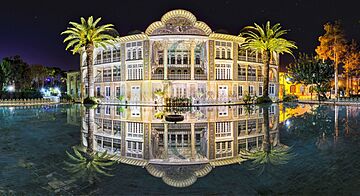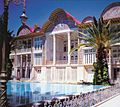Eram Garden facts for kids
| UNESCO World Heritage Site | |
|---|---|
 |
|
| Location | Shiraz, Fars province, Iran |
| Part of | The Persian Garden |
| Inscription | 2011 (35th Session) |
| Area | 12.7 ha (1,370,000 sq ft) |
| Buffer zone | 70.5 ha (7,590,000 sq ft) |
Eram Garden (which means Bāgh-e Eram in Persian) is a beautiful old Persian garden located in Shiraz, Iran. This amazing garden, along with its lovely building, sits near the Khoshk River in the Fars province. It's a place full of history and natural beauty.
Contents
A Look Back: The History of Eram Garden
Early Beginnings: A Garden Through Time
The story of Eram Garden might go back a very long time. Some people think a garden was here as early as the 12th century. This was during the Seljuk era. This older garden, possibly called Bagh-e Shah, might have been on this spot until the 1700s. It could have even inspired how the garden looks today.
Building the Garden We See Today
The garden and its beautiful buildings that we see now were mostly built in the 1800s. This was during the Qajar era in Iran. A leader named Muhammad Qoli Khan Ilkhani started the garden in 1824. He was the chief of the Qashqa'i tribe.
At that time, the garden had a three-story house. It had a front porch with two tall columns. Later, the garden was sold to Nasir ol-Molk. He hired an architect named Muhammad Hasan. This architect also worked on the famous Nasir-ol-Molk Mosque. Between 1875 and 1897, they rebuilt the main building into its current stunning form.
Eram Garden Today: A Place for Everyone
Today, Eram Garden is part of the Shiraz Botanical Garden. This garden belongs to Shiraz University. It is open for everyone to visit and enjoy. It is a special World Heritage Site. This means it is protected by Iran's Cultural Heritage Organization.
Gallery
-
The ornamental pool and date palm trees
See also
 In Spanish: Jardín de Eram para niños
In Spanish: Jardín de Eram para niños
- Persian gardens
- Iranian architecture
- Qavam House
External links
- Eram Garden Official Site (Archived): https://web.archive.org/web/20140922071450/http://www.eramgarden.org/
- Shiraz University Eram Garden (Archived)
- Iran Tourism Center: Eram Garden Information (Archived)
 | Jessica Watkins |
 | Robert Henry Lawrence Jr. |
 | Mae Jemison |
 | Sian Proctor |
 | Guion Bluford |






